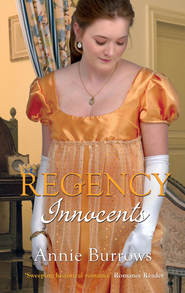По всем вопросам обращайтесь на: info@litportal.ru
(©) 2003-2025.
✖
A Mistress For Major Bartlett
Настройки чтения
Размер шрифта
Высота строк
Поля
‘You’ve even got a halo,’ he said.
She looked up, startled, and dropped her pen.
‘I’m disturbing your writing. Is it important?’ But, of course, it must be important. Anything an angel wrote was bound to be important. ‘Sorry.’
‘You don’t need to be sorry. It’s just a list.’
‘Of my sins?’ Then he would be sorry. ‘Have you got enough paper?’
She came close. Floated towards him on a violet-scented cloud.
‘I have plenty of paper, thank you.’
She sat on a chair next to his bed. The wicker work creaked.
He was in a bed. She was on a chair. He frowned.
‘This is a strange sort of hell.’
‘That’s because it isn’t hell,’ she said in that clipped, practical voice he was coming to recognise. ‘It’s Brussels.’
‘Not hell? Why not?’
‘Never you mind why not,’ she said sternly. ‘Come on, drink some of this.’
‘Why?’
‘It will make you feel better.’
‘Just looking at you makes me feel better.’
‘I wish that were true,’ she said tartly. ‘Then looking after you wouldn’t be half so much work.’
‘Why are you doing this, then?’
‘Because...I...I...well, if you don’t get well again I will never forgive myself.’
‘Not your fault.’
‘I will feel as if it is if you die on me,’ she said glumly.
‘You don’t want me to die?’
‘Of course I don’t want you to die. How can you even ask?’
‘Better dead. Nothing to live for really. Just got into the habit.’
‘Well it’s about the only habit of yours, from what I’ve heard of you, that I don’t want you to break.’
‘You’re crying again. Didn’t mean to make you cry.’
‘Well, then stop talking about dying and concentrate on getting better.’
‘And now you’re angry.’
‘Of course I’m angry. Hasn’t there been enough death already? Stop it, Tom. Stop it right now.’
He reached out and found her hand.
‘Sorry. Will try and do better.’
‘Promise me?’
‘If it means that much to you,’ he said slowly, hardly able to credit that anyone could really care that much whether he lived or died, ‘then, yes.’
After that, every time he felt the pit yawning at his back, he reached for the angel. She was always there. Even when he was too exhausted to drag his eyes open and look for her, he could tell she was near. He only had to smell the faint fragrance of violets for a wave of profound relief to wash through him. For it was her scent. And it meant she hadn’t left him.
He’d thought he would always be alone. But she hadn’t left him to his fate. And had promised she wouldn’t.
‘Hush,’ she whispered, smoothing that cool balm over his burning face and neck. ‘Don’t fret. You are going to be fine. I won’t let anything happen to you.’
* * *
He doubted her only the once, very briefly. When he thought he saw the brigade surgeon hovering over him like a great vulture.
She couldn’t have saved his life, only to turn him over to that ghoul, could she? The man liked nothing better than cutting up poor helpless victims, to see what made them tick. Oh, he said he was trying to cure them, but he spent far too much time writing up his findings in all those leather journals. The journals that were going to make his name some day. His findings, he called them.
Cold sweat broke out all over him at the prospect of falling into his hands. He’d cut him up, for sure. Lay his kidneys out in a tray.
‘Lieutenant...’ He had to screw up his face. ‘What’s the name?’ Foster, that was it. ‘Angel...’ He thought he didn’t care whether he lived or died, but the prospect of being dissected in the name of science?
‘Don’t let him cut me up.’
* * *
Lieutenant Foster straightened up, and gave Lady Sarah a hard stare.
‘You can see how confused he is. Doesn’t know his own name. Seems to think he’s a lieutenant. This is often the case with head wounds. Even though the skull itself is not fractured, injury to the brain can leave a patient with no memory, or impeded memory, or even physical impairment.’
‘But he is going to get well, isn’t he? I mean, he won’t die, now?’
‘There’s no telling, with head wounds. Men can appear to be getting well, then suddenly collapse and die,’ he said, looking more animated for a moment or two. ‘Delicate organ, the brain. All you can do is keep him as quiet and as still as you can. Let nature take its course.’
The surgeon’s eyes flicked round Sarah’s room—no, the sickroom—lingering for a moment or two on the pile of material she’d been cutting up for bandages, the bedside table with the bowl of water and sponge, pausing with a perplexed frown at the potted geranium on the windowsill, that Madame le Brun had brought in to cheer the place up.
‘There is nothing I can do for him that you can’t do just as well here,’ he finally declared, brusquely. And marched out of the room.
She hadn’t expected an army surgeon to have the bedside manner of a family doctor, naturally, but couldn’t he have spared just a moment or two to advise her? Encourage her? At least let her know she’d done an adequate job of stitching Tom’s head? And congratulate her for getting his fever down?














